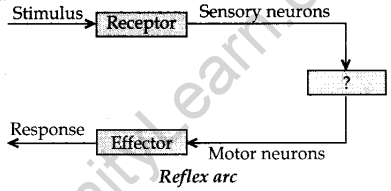Table of Contents
Class 10 Science MCQs Chapter 7 Control and Coordination
MCQ Questions for Class 10 Science Control and Coordination with Answers provide a valuable resource for students to reinforce their understanding of this topic, as outlined in the Class 10 Science syllabus. These multiple-choice questions cover essential concepts such as nervous system, endocrine system, reflex actions, and coordination in organisms. By practicing these MCQs, students can assess their knowledge and improve their grasp of the intricate mechanisms involved in control and coordination in living organisms.
1. Which plant hormone promotes dormancy in seeds and buds?
(a) Auxin
(b) Gibberellin
(c) Cytokinin
(d) Abscisic acid
Answer
Answer: d
2. Roots of plants are:
(a) positively geotropic
(b) negatively geotropic
(c) positively phototropic
(d) None of these
Answer
Answer: a
3. Response of plant roots towards water is called:
(a) Chemotropism
b) Phototropism
(c) Hydrotropism
(d) Geotropism
Answer
Answer: c
4. Movement of sunflower in accordance with the path of Sun is due to
(a) Chemotropism
(b) Geotropism
(c) Phototropism
(d) Hydrotropism
Answer
Answer: c
5. Which plant hormone promotes cell division?
(a) Auxin
(b) Gibberellin
(c) Cytokinin
(d) Abscisic acid
Answer
Answer: c
6. The main function of abscisic acid in plants is
(a) to promote cell division.
(b) to inhibit growth.
(c) to promote growth of stem.
(d) to increase the length of cells.
Answer
Answer: b
7. Fall of mature leaves and fruits from plants is triggered by which of the following substance?
(a) Auxin
(b) Cytokinin
(c) Gibberellin
(d) Abscisic acid
Answer
Answer: d
8. Any change in the environment to which an organism responds is called
(a) stimulus
(b) coordination
(c) response
(d) hormone
Answer
Answer: a
9. A part of the body which responds to the in-structions sent from nervous system is called
(a) receptor
(b) effector
(c) nerves
(d) muscles
Answer
Answer: b
10. The longest fibre on the cell body of a neuron is called
(a) sheath
(b) cytoplasm
(c) axon
(d) dendrites
Answer
Answer: c
11. Which nerves transmit impulses from the cen¬tral nervous system towards muscle cells?
(a) Sensory nerves
(b) Motor nerves
(c) Relay nerves
(d) Cranial nerves
Answer
Answer: b
12. A microscopic gap between a pair of adjacent neurons over which nerve impulses pass is called
(a) neurotransmitter
(b) dendrites
(c) axon
(d) synapse
Answer
Answer: d
13.

Give the missing term.
(a) Spinal cord
(b) Brain
(c) Cranial nerves
(d) Relay nerves
Answer
Answer: a
14. The highest coordinating centre in the human body is
(a) spinal cord
(b) heart
(c) brain
(d) kidney
Answer
Answer: c
15. Main function of cerebrum is
(a) thinking
(b) hearing
(c) memory
(d) balancing
Answer
Answer: a
16. Posture and balance of the body is controlled by
(a) Pons
(b) Medulla oblongata
(c) Cerebellum
(d) Cerebrum
Answer
Answer: c
17. Breathing is controlled by which part of the brain?
(a) Cerebrum
(b) Cerebellum
(c) Hypothalamus
(d) Medulla oblongata
Answer
Answer: d
18. Which part of nervous system controls the re¬flex activities of the body?
(a) Brain
(b) Spinal cord
(c) Cerebrum
(d) Cerebellum
Answer
Answer: b
19. Which of the following acts as both endocrine and exocrine gland?
(a) Pancreas
(b) Thyroid
(c) Adrenal
(d) Liver
Answer
Answer: a
20. Identify which of the following statements about thyroxin is incorrect?
(a) Thyroid gland requires iodine to synthesize thyroxin.
(b) Thyroxin is also called thyroid hormone.
(c) It regulates protein, carbohydrates and fat metabolism in the body.
(d) Iron is essential for the synthesis of thyroxin.
Answer
Answer: d
21. Which gland secretes the growth hormone?
(a) Pituitary gland
(b) Thyroid
(c) Hypothalamus
(d) Adrenal
Answer
Answer: a
22. The secretion of which hormone leads to physical changes in the body when you are 10-12 years of age?
(a) Oestrogen from testes and testosterone from ovar.
(b) Estrogen from adrenal gland and testosterone from pituitary gland.
(c) Testosterone from testes and estrogen from ovary.
(d) Testosterone from thyroid gland and estrogen from pituitary gland.
Answer
Answer: c
23. A diabetic patient suffers from deficiency of which hormone?
(a) Thyroxine
(b) Testosterone
(c) Oestrogen
(d) Insulin
Answer
Answer: d
24. Which of the following endocrine glands does not exist in pairs?
(a) Testes
(b) Adrenal
(c) Pituitary
(d) Ovary
Answer
Answer: c
Also Read:
Fill in the Blanks
1. Control and coordination are the functions of the nervous system and ……… in our body.
2. The nervous system uses ……… impulses to transmit messages.
3. Central nervous system consists of ……… and ……… .
4. Largest part of the brain is ……… .
5. Defeciency of ……… hormone in childhood leads to dwarfism in humans.
6. The growth of pollen tubes towards the ovules is the result of a ……… movement.
Answers
1. hormones
2. electrical
3. brain, spinal cord
4. cerebrum
5. growth
6. chemotropic
NCERT Solutions for Class 10 Science: All Chapters
- Chapter 2 – Acids, Bases, and Salt
- Chapter 5 – Periodic Classification Of Elements
- Chapter 6 – Life Processes
- Chapter 7 – Control and Coordination
- Chapter 8 – How do Organisms Reproduce?
- Chapter 9 – Heredity and Evolution
- Chapter 10 – Light Reflection and Refraction
- Chapter 12 – Electricity
- Chapter 14 – Sources of Energy
- Chapter 15 – Our Environment
- Chapter 16 – Sustainable Management of Natural Resources
We hope the given MCQ Questions for Class 10 Science Control and Coordination with Answers will help you. We have also provided notes of each chapter of Science If you have any query regarding CBSE Class 10 Science Chapter 7 Control and Coordination Multiple Choice Questions with Answers, drop a comment below and we will get back to you at the earliest.




